The information here will provide regular updates on the SHCRP work as it develops instigating during the phases of the project.
Find out more about the SHCRP on the main page below.
More on the SHCRP here >
Brighton and Sussex Medical School
Box heading - text only
Box strapline - text only
Button link - add button-link-white class to link
Box heading - text only
Box strapline - text only
Button link - add button-link-white class to link

January 2026
Research Training Hub Update

January 2026
Acute Sector Lead Role for the Sussex Health and Care Research Partnership

December 2025
Conference Break Out Sessions Point the Way Forward

November 2025
Catalyst Fund Update

NOvember 2025
The Sussex NIHR Commercial Research Delivery Centre

November 2025
Strategy and Delivery Focus at Conference

November 2025
REN Progress Highlighted at SHCRP Conference

November 2025
Meet Dr Daisy Woolham, a ID/Microbiology registrar who has commenced her one-year University Hospitals Sussex Accelerator Award

October 2025
News from Sussex Mental Health Research Engagement Network

September 2025
Martin Llewelyn to step down as Academic Director of SHCRP

June 2025
Guidance Toolkit for health and social care researchers and PPIE teams

June 2025
New Sussex research strategy to help improve health and care

June 2025
Research Ready Communities – West Sussex Workshop

June 2025
Working together to shape Cancer Research Engagement (REN) in Sussex

June 2025
Summer of Research at the University of Sussex

April 2025
NIHR RfPB July 2025 Funding Opportunity – Sussex Information Event
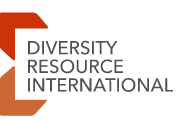
March 2025
Community Research: Principles, Ethics, and Cultural Humility
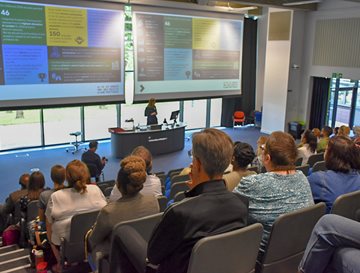
March 2025
Sussex Clinical Academic Conference 2025

February 2025
Sussex HCRP Research Catalyst Fund – Successful Projects Announced
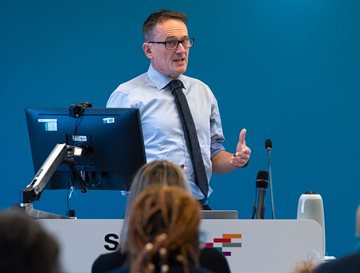
December 2024
Commercial Research Delivery Centre brings £3.5million investment for University Hospitals Sussex
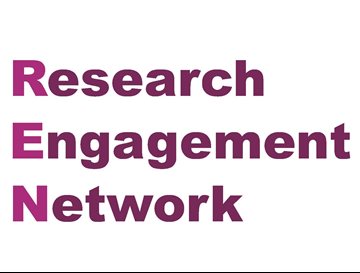
November 2024
Senior Research Engagement Network Programme Officer Vacancy
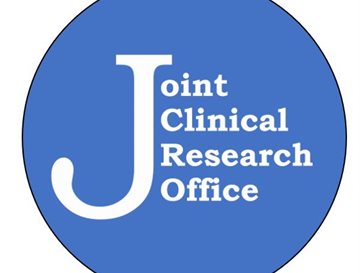
November 2024
Research Manager Vacancy - Joint Clinical Research Office
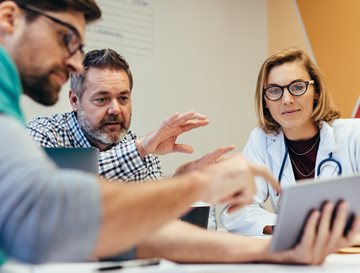
November 2024
Research Catalyst Funding Call is now Open – deadline November 30
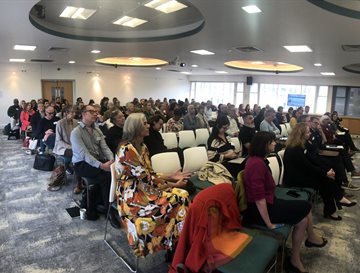
October 2024
Second annual SHCRP conference takes place with more than 130 delegates

October 2024
2025 NIHR Academic Clinical Fellow posts – apply now!
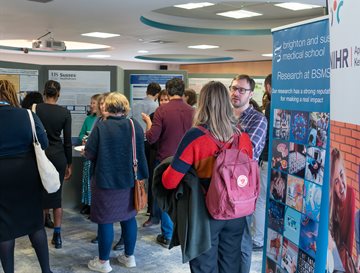
September 2024
2024 SHCRP Conference

August 2024
NHS Sussex Research strategy
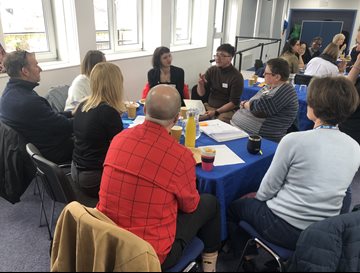
July 2024
Community Research Final Paper Published
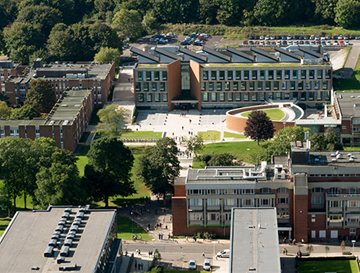
July 2024
Vacancy: Senior Research Methodology Advisor (Statistics/Epidemiology)
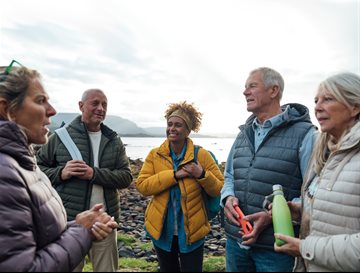
MAY 2024
New funding for Coastal Community and Creative Health in Hastings – join the symposium
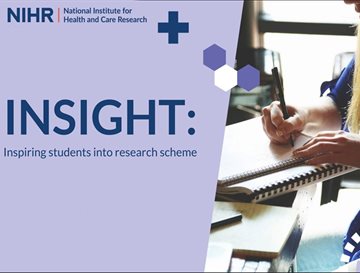
May 2024
INSIGHT Award offers masters opportunities to allied healthcare and local authority professionals

MAY 2024
Launch of new Health and Care Research Training Hub website
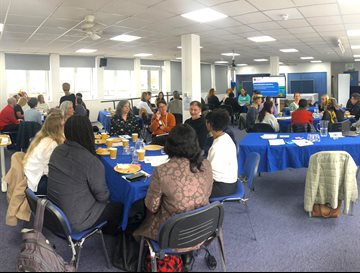
MAY 2024
REN celebration event

APRIL 2024
Callout to researchers

APRIL 2024
Research Engagement Network (REN) project update

March 2024
SHCRP PCIE update

February 2024
Researcher Spotlight: Dr. Diane Sellers, Chailey Clinical Services
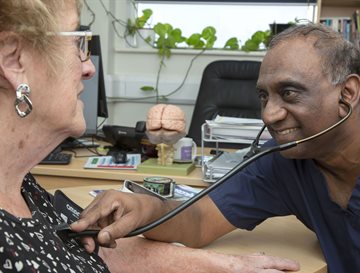
October 2023
NHS England REN Cohort 2 Partners – joint statement

September 2023
Speakers announced for October annual conference

August 2023
Abstract submissions encouraged for Health Research Partnership conference

July 2023
Recruitment of Public Advisers to the SHCRP

June 2023
The second Health Research Partnership conference announced

February 2023
Virginia Govoni joined us as the new Head of SHCRP and JCRO
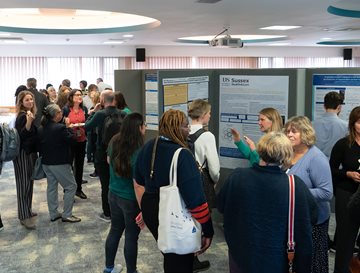
October 2022
Write up about SHCRP launch event

sEPTEMBER 2022
Survey to understand the research landscape across BSMS
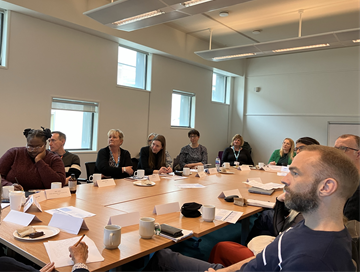
jUNE 2022
First SHRCP executive meeting
BACKGROUND IMAGE FOR PANEL
January 2026
Research Training Hub Update
As we welcome in the new year we’re proud to look at what our Research Training Hub has achieved in 2025 to strengthen research capacity and nurture a growing region of talented researchers.
Highlights from the year:
- Launched our first ever event series with a range of successful online events – watch the recordings here.
- Established the Sussex Nurses Research Network now with 100+ members and events every 2 months with inspiring speakers from across the region.
- Delivered the third annual Sussex Clinical Academic Conference, welcoming 150 guests and focusing on Getting into research.
- Expanded our Careers Advisory service to offer more appointments and a monthly Integrated Academic Training drop-in session – click here to apply.
- Supported the BSMS submission to the 2025 NIHR Integrated Academic Training (IAT) Programme, resulting in the award of 5 ACFs and 3 Clinical Lecturer posts for 2025/2026. Read more about the BSMS IAT Programme here.
Looking ahead:
A brand-new Spring events programme led by the University Hospitals Sussex Knowledge and Libraries team – click here to see the programme. We are planning further sessions focusing on Public and Patient Involvement later in the year.
Save the date: Sussex Clinical Academic Conference returns 1 July – more details coming soon!
To stay up to date on all Research Training Hub activities and news, click here to register for the SHCRP mailing list.
January 2026
Acute Sector Lead Role for the Sussex Health and Care Research Partnership
Applications are invited for the Acute Sector Lead role within the Sussex Health and Care Research Partnership (SHCRP), providing strategic leadership for the Research into Practice workstream and supporting the translation of research into improved health and care outcomes across Sussex. The role is open to experienced healthcare researchers working within the Sussex Integrated Care System and involves membership of the SHCRP Executive Group (up to 1 PA, three-year term).
See the full job description here >
December 2025
Conference Break Out Sessions Point the Way Forward
Our conference this year was excited to offer three breakout sessions; the first about developing access to research careers for public health professionals, and the second about how to encourage meaningful engagement and involvement in research across Sussex’s many diverse communities. Our third breakout session was a fascinating visit to the University of Sussex’s Robotics and Sensing facilities to see how technical innovation could transfer the lives of those communities.
Session One
This session, led by Kate Gilchrist, NIHR Research Public Health Engagement Lead for Sussex and Nicola Sheen and Louise Hayes from NIHR Specialist Centre for Public Health, gave an overview of the support available from NIHR for Public Health and wider local authority and community sector partners from the Specialist Centre. This included online training and support, as well as funded short placements to post-doctoral funded fellowships. We heard from staff across Sussex who have/are undertaking these career development opportunities about their experience. Each local authority then talked about how they are developing research in their council, and some examples of recent research collaborations.
There was a lot of interest in the resources and support available and in supporting the public health and council workforce to take up these opportunities, as well as discussion about some of the barriers we need to consider. Next steps include broadening the support to Public Health and local authorities through the SHCRP Research Training Hub, promoting career develop opportunities and resources more broadly across Public Health and councils, and specifically that we will run a similar session at the April Sussex Public Health Workforce Conference to raise awareness with the wider Public Health workforce.
PublicHealthIntelligence@brighton-hove.gov.uk
iat@bsms.ac.uk
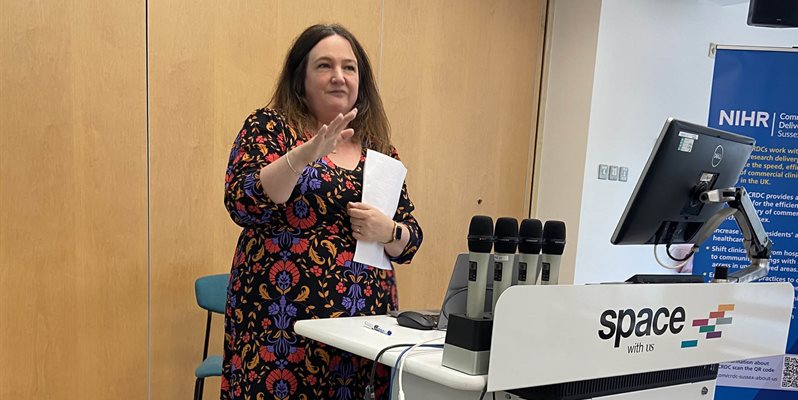
Kate Gilchrist
Session Two
This session was led by Maddy Bell of the Regional Research Delivery Network, and Lou Goodall of University Hospitals Sussex. It marked the third meeting of the emerging Sussex Research Engagement Collaborative. The purpose of the session was to explore how the whole research system can work collaboratively and in partnership with communities, to share opportunities for participation, involvement and engagement with health and care research for the population of Sussex. The conference session provided an opportunity to engage a wider audience in this conversation, most importantly patients and VCSE organisations.
Workshop attendees explored how to provide a joined-up research offer to the whole Sussex population. What would that look like? How can we practically share those opportunities whilst respecting relationships? Who else needs to be part of this conversation?
Solutions put forward included establishing communities of practice, shared training, a networked structure, creative methodologies and coordination between parts of the research system. Shared values were clear: mutual benefit, trust and transparency. A joined-up research offer to Sussex’s communities is possible with time and commitment. If you are interested in joining our conversation or learning more about our plans, please contact hcrp@bsms.ac.uk.
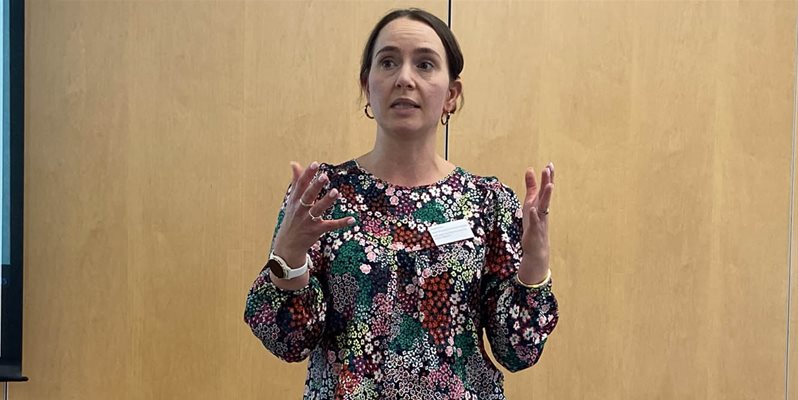
Maddy Bell
Session Three
This session took delegates out of the conference centre and on a tour of the University of Sussex’s robotics facilities. Leading the tour was Dr Elizabeth Rendon-Morales. Dr. Rendon-Morales is a Senior Lecturer in Electrical and Electronics Engineering in the Department of Engineering and Design at the University of Sussex. Her current research is concentrated on the design, development and testing of sensing electronic systems and medical instrumentation.
The tour took the delegates through research facilities dedicated to such areas as advanced lasers and imaging systems, bioartificial organ research, teleoperated robots, precision sensing, rehabilitative robotics, and assistive hand exoskeleton and neural interfacing.
Dr Rendon-Morales was delighted with the response from delegates to the facility and is keen to forge collaborative partnerships with healthcare professionals. We will plan another meeting soon to promote connections, funding opportunities and collaborations.
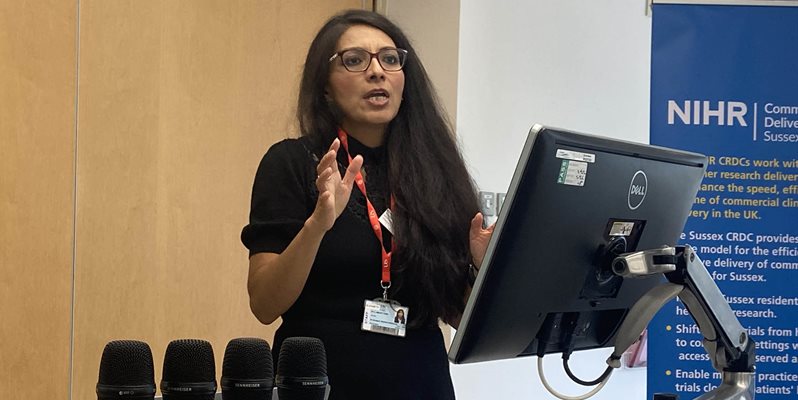
Dr Elizabeth Rendon-Morales
Please feel free to contact the academics below if you’d like to know more and E.Rendon-Morales@sussex.ac.uk about any challenge you wish to address in your discipline.
- Advanced lasers and imaging systems for healthcare - Rodrigo Aviles-Espinosa (Lead) R.Aviles-Espinosa@sussex.ac.uk
- Bioartificial organ research - Cyril Crua (lead) C.Crua@sussex.ac.uk
- Human activity and diagnosis with computer vision - Phil Birch (lead) P.M.Birch@sussex.ac.uk
- Teleoperated robots in healthcare – Carlo Tisseo (lead) C.Tiseo@sussex.ac.uk
- Soft Robotics and Technologies in healthcare - Nicolas Herzig (lead) N.F.Herzig@sussex.ac.uk
- High Precision Robotics and Sensing for healthcare - Elizabeth Rendon-Morales (lead) E.Rendon-Morales@sussex.ac.uk
- Assistive and rehabilitation Robotics – Yanan (Lead) yl557@sussex.ac.uk
- Augmenting human capability with robotics, Yanpei Huang (lead) Yanpei.Huang@sussex.ac.uk
- Assistive hand exoskeleton and neural interfacing - Hsien-Yung Huang (lead) HsienYung.Huang@sussex.ac.uk
BACKGROUND IMAGE FOR PANEL
November 2025
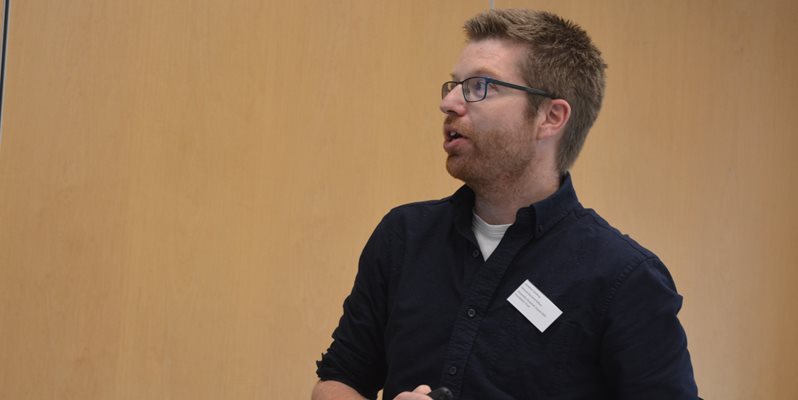
Dr Jonathan Golding
Catalyst Fund Update
As part of our commitment to working in partnership, the NHS Sussex-funded Catalyst Fund was made available earlier this year to projects demonstrating a clear commitment to partnership working and translating research into deliverable outcomes in the community. We were pleased to be able to support four projects, each of which reported their progress to the SHCRP 2025 Conference.
Dr Jonathan Golding, specialist registrar at University Hospitals Sussex, presented his project on Community Management of Type 1 Diabetes and Dementia. He explained that with the global prevalence of Type 1 Diabetes increasing, self-management presents a number of challenges for an ageing population. This is especially true for individuals with dementia. He demonstrated how a glucose sensor, alongside a control algorithm, could trigger a body-worn insulin pump, to avoid the dangerous peaks and troughs in blood sugar over the course of a day. His project involved setting up workshops with relevant clinical professionals and those with lived experience to discuss how such a solution would work in practice.
Prof Carrie Llewellyn, Dr Kiersten Simmons and Dr Nina Lockwood (BSMS) presented their work on transforming mid-life women’s intimate health and wellbeing in underserved coastal regions. The aims of the project are to broaden capacity in women’s intimate health research by building external collaborations, interrogating regional data, and ultimately co-producing funding bids for women’s intimate health research projects.
The project held a series of stakeholder engagement events across the county, and in June 2025 submitted a stage 1 NIHR Research for Patient Benefit grant proposal on ‘The intimate health and wellbeing of midlife women in coastal regions: A Health Equity Lens’. The team continues to develop collaborative work and aims to bid for further NIHR funding.
Dr Patrick Nyikavaranda spoke eloquently on the barriers faced by ethnic minorities in England in accessing mental health support, as part of the Catalyst project he contributed to, led by Professor Anjum Memon at BSMS. Their project held three community focus groups, each centred around a specific ethnic minority group, at which they identified barriers such as the perceived shame around seeking help, the systematic invisibility of their communities, and the roles of faith and gender expectations in dissuading those in need from reaching out. Dr Nyikavaranda highlighted the importance of culturally-rooted, peer-led mental health support to break down the significant barriers these communities experience.
The final Catalyst project was led by Brighton-based charity Sussex Interpreting Service (SIS). SIS enables people with language needs full access to publicly-funded services in order to improve health, education and quality of life. Laura Gilbert, Projects Coordinator, spoke about how the funding supported the development of an Inclusion Toolkit for researchers to facilitate the inclusion in health and care research of people requiring bilingual support. SIS held a series of focus groups to fully understand the needs at each stage of the research process, from the points of view of all stakeholders; academics, clinicians, policy makers and the communities themselves. The toolkit is currently in the writing stage, and will be presented in draft form to focus group participants later in the year.
We thank the project leaders for the illuminating insights they shared through their presentations.
November 2025
The Sussex NIHR Commercial Research Delivery Centre (CRDC)

Prof Mark Hayward
In December 2024, University Hospitals Sussex Foundation Trust (UHSx) was successful in its bid to host an NIHR Commercial Research Delivery Centre. Since then it has been busy building the team and infrastructure for the project, and was pleased to be able to soft-launch the Centre at our conference.
Professor Martin Llewelyn, Director of the CRDC, explained how the Centre will enable the acute Trust to offer patients access to innovative treatments, devices and tests. This will provide better health outcomes for their patients. For the commercial sector, it means access to a huge patient cohort, backed up with excellent data infrastructure, to enable the exploration of innovative approaches to healthcare.
A key part of CRDC’s remit is to increase participant recruitment and retention by expanding clinical trials beyond large hospital trusts and into community settings and underserved regions. To achieve this, public and community representation is absolutely key, and the CRDC has established a stakeholder group to ensure the Centre’s research fully reflects the diversity of Sussex’s population.
The Centre will also be working closely with the Research Engagement Network to proactively reach communities who have historically been excluded from participation in research. The Centre will also support more GP practices to become research active, bringing trials even closer to people’s homes.
Professor Mark Hayward of Sussex Partnership NHS Foundation Trust (SPFT), Deputy Chair of the CRDC Steering Group, explained that the Sussex CRDC is one of three CRDCs with a special focus on mental health and dementia research. The CRDC and SPFT will work together to increase the opportunities to participate in clinical trials offering treatment for mental health conditions and dementia.
The CRDC will broaden the range of research to include trials for both healthy volunteers and patients with conditions – widening access to innovative treatments and interventions. It also offers the perfect opportunity to develop and expand Sussex’s commercial research delivery workforce. This will be a tremendous step forward in the efficient and inclusive delivery of commercial clinical research for Sussex.
BACKGROUND IMAGE FOR PANEL
November 2025
Strategy and Delivery Focus at Conference
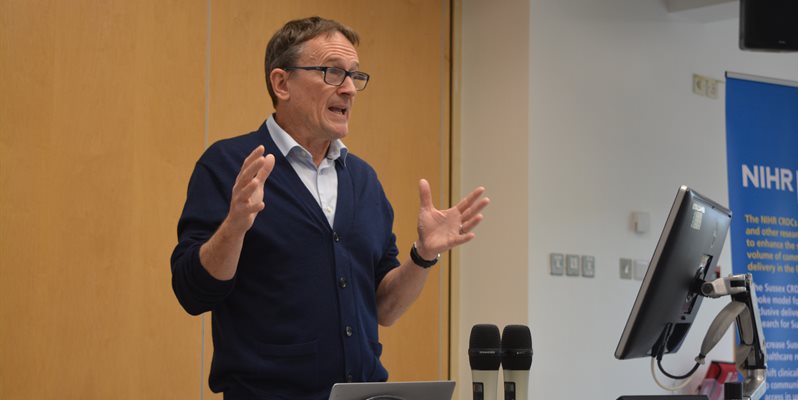
Prof Martin Llewelyn
It was Professor Martin Llewelyn’s last conference as SHCRP Academic Director, and in his opening address he reflected on the journey the Partnership has undertaken over the past year.
Martin highlighted the importance of engaging our partners, expanding population involvement, growing our research workforce, supporting the Partnership’s collaborative research centres, and developing our research and data infrastructure in pursuit of delivering the SHCRP Strategy, Improving Lives Together through Research.
We now have a revised Executive Group with leads identified for each of the workstreams, collaboration, research infrastructure, data infrastructure, workforce, community and population challenges and research into practice, and an engaged Board with representation from senior stakeholders across the system.
He noted the many challenges ahead. The NHS’ 10-year health plan Fit for the Future reinforces the importance of regional collaboration, especially with the National Institute of Health Research (NIHR) infrastructure, such as the Applied Research Collaboration, and the Health Innovation Network. While further changes are happening with commissioning and local authorities across the region, the Partnership continue to focus on strategic collaborations for health and care research to deliver real change to health and wellbeing in Sussex.
We wish Martin every success in his new role with the Sussex Commercial Research Delivery Centre.
BACKGROUND IMAGE FOR PANEL
November 2025
REN Progress Highlighted at SHCRP Conference
This year’s SHCRP Conference demonstrated that the Sussex Research Engagement Network (REN) has gone from strength to strength in the last year, recruiting a further nine community researchers and engaging more voluntary sector organisations to participate. Two major projects have taken place in the past few months, the REN Cancer Project, and the REN Mental Health Project. Each of these projects sought to empower those with lived-experience to develop research projects that built on developing trust within their communities. The testimony of those with first-hand knowledge is essential in guiding future research projects, and ultimately in helping the reduction of health inequalities in Sussex.
Cancer Project

Maha Mustafa
The REN Cancer Project involved the co-production of a Public and Community Involvement and Engagement (PCIE) plan for the Sussex Cancer Research Centre (SCRC). Led by Diversity Resource International and supported by VCSE partners, 15 community researchers conducted 47 interviews with individuals affected by cancer across Sussex. Maha Mustafa (above) was recruited as a community researcher by the Trust for Developing Communities as part of the Project. She interviewed three people from diverse communities about their experiences of cancer care and of the SCRC. In Maha’s culture, women are not encouraged to challenge or confront health professionals, which keeps them uninformed. Key findings highlight systemic delays, language barriers, cultural stigma, and limited awareness of SCRC. Participants expressed willingness to engage in research if supported by culturally sensitive, accessible, and inclusive approaches. The project found that multilingual outreach, peer support, community liaison roles, and sustained partnerships is needed to embed community voices in cancer research and care planning.
Mental Health Project
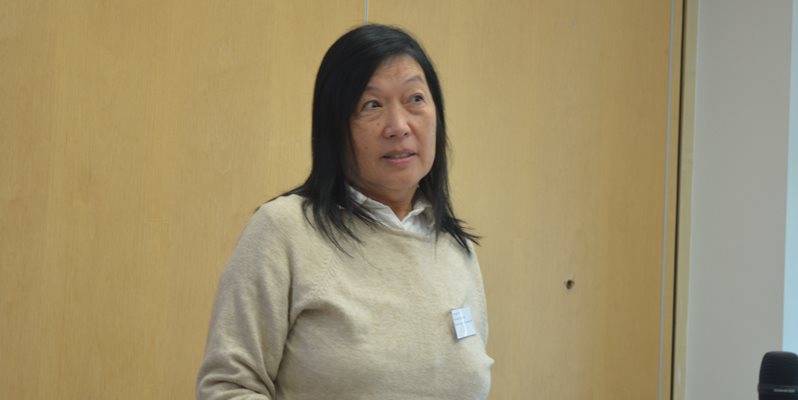
Chi Ling Chan
The Community Voices for Involvement and Engagement of Women in Mental Health Research programme aimed to improve engagement and participation in mental health research among underserved women, with a focus on intersectionality. The collaborative programme focused on women and people who utilise women’s health services in four communities-of-identity in Core20PLUS5 areas: homeless, neurodivergent; English not the first language, Trans, Non-Binary & Intersex groups (TNBI) and women (50+) experiencing isolation and deprivation. Chi Ling Chan (above) was recruited as a Community Researcher by Diversity Resource International to take part in the project. Her project used storytelling workshops to address the gap in mental health research participation amongst older members of the Cantonese Chinese community. The ten women who participated each brought a treasured object, such as a photograph, to the workshops, and through the object explored their difficulties in having their needs understood and met by services in the UK. The film of their stories serves as a testament to their experiences. The programmes have increased confidence and involvement among underserved women, enabling them to contribute lived experience to shape more inclusive research. Insights gained from the projects are now being shared across regional networks to inform future research and improve accessibility for underserved groups.
November 2025
Meet Dr Daisy Woolham, a ID/Microbiology registrar who has just commenced her one-year University Hospitals Sussex Accelerator Award
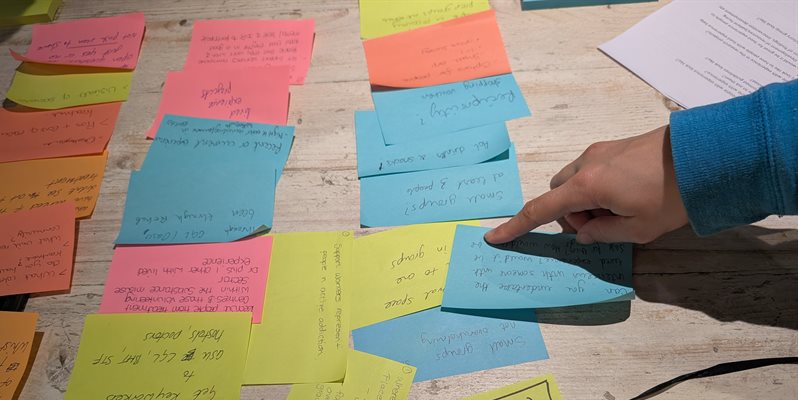
Dr Daisy Woolham is a ID/Microbiology registrar and has just commenced her one-year University Hospitals Sussex Accelerator Award, whilst preparing a PhD application looking at bacteraemias in local hard-to-reach populations. Here, Dr Woolham explains how involving people with lived experience informed her research on treating people who inject drugs.
“As a clinician and researcher planning a fellowship application on the best ways to treat infections in people who inject drugs, I want my research on this topic to be relevant, important and useful to the people it concerns. Having spent time shadowing the local homeless in-reach team, and drug and alcohol services in the hospital, I was signposted to Common Ambition, a local co-production charity.
With support from the Research Engagement Network and CINAMR, in September I partnered with Common Ambition for two in-person PPIE group sessions. Here, I received input from people with lived experience of drug use. Conducting the work with Common Ambition meant I could feel confident that the sessions would be trauma-informed and that participants would be supported in navigating some potentially sensitive subjects.
The sessions were extremely valuable to my research. Through lively discussions, participants provided answers to questions on research methodology, and had insights into the best ways to engage people with lived experience locally. As a result of their input, I have made changes to my research methodology. For example, I now plan to recruit people with lived experience in recovery rather than in hospital, to avoid causing trauma. I am also making sure that my data collection tools capture information on the availability of support services and housing, as group members stressed that these are crucial factors in treatment failure or success.
I hope that some of my PPIE group members will be able to become advisors on the project going forward, and I plan to share my findings on research priorities with my wider research department. I would like to thank Common Ambition, CINAMR, and REN for their support.”
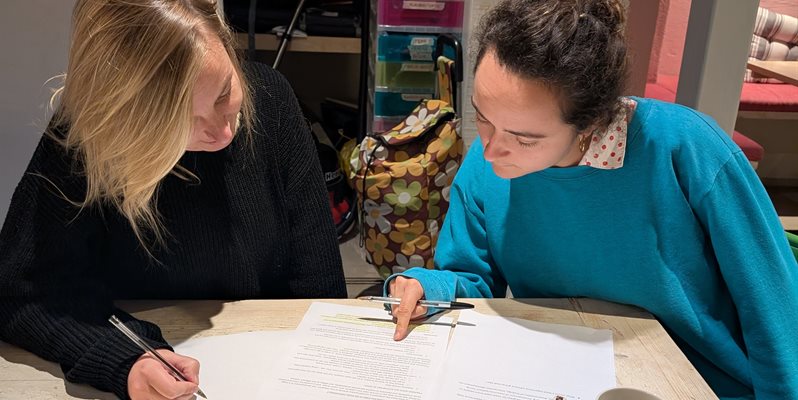
BACKGROUND IMAGE FOR PANEL
October 2025
News from Sussex Mental Health Research Engagement Network
We have shown that community research can help take a leap forward in Mental Health research that really tackles health inequalities.
Our Community Researchers have drawn on their lived experience, local knowledge and trusted relationships to successfully engage women and users of women’s health services in mental health research.
They used creative methods such as dance and movement, cooking, zine-making, narratives and filmmaking, to create inclusive, safe and meaningful opportunities for participation. This has helped to amplify voices that are often underrepresented in traditional research approaches.
The researchers collaborated with individuals and communities representing a diverse range of lived experiences, including:
- People experiencing homelessness
- Neurodivergent individuals
- Black and racially minoritised people for whom English is an additional language
- Older adults (aged 50+) experiencing social isolation in East Brighton
- Members of Trans, Non-Binary, and Intersex (TNBI) communities.
Find out more information on the projects here >
With thanks and congratulations to our amazing Sussex-based Voluntary Community Social Enterprises:
Sussex Interpreting Services
Just Life, Brighton
Diverse Resource International
The Clare Project
Trust For Developing Communities – East Brighton Forum
BACKGROUND IMAGE FOR PANEL
September 2025
Martin Llewelyn to step down from his role as Academic Director of SHCRP
Prof Martin Llewelyn is stepping down from his role as Academic Director of the Sussex Health and Care Research Partnership. During his 3 years post, Martin has played a key role in developing the partnership from a local NHS and University collaboration to a strategic regional partnership with BSMS, the region’s three universities, NHS Sussex and partners across the Sussex Integrated Care System.
Martin said: “It has been an honour to lead the partnership and help shape its development. Sussex as a System has enormous potential for research growth and we have already seen how a strong partnership is key to increase research funding and opportunities to attract and develop researchers, such as the new Commercial Research Delivery Centre and NIHR Research Internships. I will continue to work closely with the Partnership in my role as Director of Research at UHSx and as an academic at the medical school”.
James Ramsay, Chair of the Partnership and CMO of NHS Sussex, said: “It has been a pleasure to work with Martin and the HCRP Team in the past year. With his confident leadership and research insights, Martin has developed some strong foundations and has coordinated and led the development of our first Research Strategy for the Sussex Health and Care System. We are very grateful for his hard work and dedication; he will be missed”.
Dr James Price has been appointed to take on the role from October, with Martin supporting him in the transition. James is Associate Professor in Infection and Director of the Centre of Infection and Antimicrobial Research (CINAMR) at BSMS and Honorary Consultant in Infectious Diseases and Microbiology at UHSx. He brings strong academic and clinical leadership and a new enthusiasm for expanding the partnership and strengthening connections.
James said: “I am delighted to be taking on the role of Academic Director of the Sussex Health and Care Research Partnership. This is an exciting opportunity to further strengthen collaborations across our universities, NHS partners, local authorities, and communities to embed research at the heart of health and care in Sussex. I look forward to working with colleagues across the system to ensure our research reflects the needs of our population, supports our workforce, and delivers real improvements in services and outcomes.”
June 2025
Guidance Toolkit for health and social care researchers and PPIE teams
Our Catalyst Fund recipient Sussex Interpreting Services (SIS) is producing a Guidance Toolkit for health and social care researchers and PPIE teams to facilitate including people with language needs in health and care research in Sussex as part of its NHS Sussex-funded project. It will include insight from all stakeholders and is inviting interested individuals to take part in a one hour, online focus group on either 14 July at 11am or 15 July at 2pm. More details are included the below document.
Download the document here >
Please RSVP to vikki@sussexinterpreting.org.uk by 5pm on Monday 30 June. £25 retail voucher for participants.
BACKGROUND IMAGE FOR PANEL
June 2025
New Sussex health and care research strategy to help improve health and care
NHS Sussex and the Sussex Health and Care Research Partnership at Brighton and Sussex Medical School, have launched the first research strategy for Sussex, which sets out our collective ambitions for health and care research for the next five years.
The strategy has been developed collaboratively with health and care professionals from across all the health and care organisations in Sussex, public health and the local authorities, and with input from our university partners, voluntary sector partners and the wider public and communities.
This approach seeks to enhance patient care, address local health and priorities, and foster a culture of continuous improvement across Sussex. The strategy will do this by:
- Addressing local and national health and care priorities: by working on research priorities which look to tackle health challenges specific to Sussex, while aligning with broader national research goals
- Enhancing quality of care: by integrating evidence-based research into daily practices, the strategy aims to improve the quality and outcomes of health and care services for people who live in Sussex
- Expanding research scope: efforts will be made to increase the volume and diversity of research conducted locally, extending into primary care and community health settings
- Promoting equity and inclusion: a significant focus is placed on reducing disparities in research participation and ensuring that innovations benefit all segments of the population
- Supporting the research workforce: To build capacity, the strategy outlines initiatives to support healthcare professionals in engaging with research. This includes training, streamlined processes for research approvals, and the development of a diverse and skilled research workforce.
The strategy sees the NHS in Sussex strengthening ties with local universities, research organisations, and community groups, and the forming of the Sussex Health and Care Research Partnership serves as a central hub to coordinate research activities, share resources, and align strategies across the Integrated Care System (ICS).
James Ramsay, Chief Medical Officer at NHS Sussex, said: "The research strategy is an important piece of our shared work to improve the healthcare of people who live in Sussex. The strategy focuses on research that helps the population of Sussex to live healthier lives, have access to the best possible services and treatments when they need them, and maximises the social, and economic benefits research offers to our health and care system and region."
Richard McManus, Dean at Brighton and Sussex Medical School, said: "Brighton and Sussex Medical School have been extremely pleased to be one of the key founding members of this partnership. We think that that the only way that one can do really good research is collaboratively so working together with partners in the NHS and social care is fundamental. What we’re aiming to do in terms of our research is to improve both quality and quantity of life so, as a member of the public, I would hope that you’d be able to look back in five or ten years time and say this health and research partnership has led to increases in research in Sussex and those increases have directly led to improvements in health."
Read the full research strategy or watch the video below, where we explain how the strategy will help improve the health of people in Sussex.
BACKGROUND IMAGE FOR PANEL
June 2025
Research Ready Communities – West Sussex Workshop
The Research Ready Communities programme was initiated with funding from the Sussex Research Engagement Network (REN). The idea behind the initiative was to collaborate with communities on community-led research ideas.
Following on from the successful workshops held in East Sussex and Brighton & Hove, a West Sussex workshop was co-designed and co-delivered West Sussex County Council (WSCC) Public Health and Social Research Unit and Voluntary Action Arun and Chichester (VAAC). Held on 24th April in Bognor Regis, the aim of the workshop was to support local groups and charities in using research techniques to assist with funding applications, as well as to gather monitoring and evaluation data.
There are strong parallels between the way a research question is framed and how charities and community groups can use existing data or collect their own information to demonstrate the need for their services, or to measure the impact of services delivered. Prior to the event, a questionnaire was sent out to assess how confident participants felt in undertaking research.
In total, 14 local organisations attended the workshop. These organisations work across various sectors, including the arts, mental health, poverty, homelessness, families, young people, and vision impairments. From a VAAC perspective it was good to see a range of organisations attending and some that haven’t engaged in training or networking events before.

During the session, Jacqueline Clay, Catherine Wells, and Tahmida Khanom from WSCC presented segments covering the fundamentals of research, practical and ethical considerations, and methods for sharing and communicating findings.
Following these presentations, participants engaged in a breakout session, during which they took part in a practical scenario exercise. This exercise involved examining potential projects for which organisations might seek funding and identifying ways to measure the outcomes and benefits.
Jacqueline then guided participants through the findings of the Your Health Matters – Community Survey 2024 and introduced a range of data sources and resources and how to use them. These included Office for National Statistics, Nomis, Fingertips and West Sussex Post Code look up tool. Participants indicated that they found this section particularly useful.
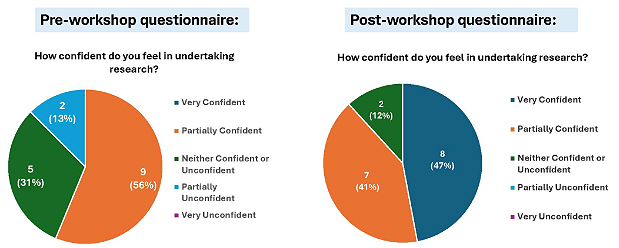
Ideas for future workshop sessions included:
- Practical support with creating surveys, data collection, and analysis
- Real-life case studies from community groups and charities that have successfully implemented research techniques
- Addressing the issue of time constraints faced by small charities.
A suggestion was made for organisations to collaborate on funding research efforts and apply the insights to their work.
June 2025
Working together to shape Cancer Research Engagement (REN) in Sussex
The Cancer REN is co-designing a new engagement plan for the Sussex Cancer Research Centre (SCRC), shaped by lived experiences of cancer.
Community Research
Diversity Resource International (DRI) lead the recruitment of 10 new Community Researchers (CRs) with personal cancer experience, joining 8 from REN Phase One. Through workshops, they co-developed research materials approved by an ethics panel. The CRs conducted 47 interviews across their communities, in multiple languages, identifying challenges in cancer care and research participation.
Key Findings and Next Steps
In May, representatives from the SCRC and cancer support organisations joined CRs to discuss key findings and shape next steps.
Challenges in Cancer Care:
- Delays in diagnosis/treatment worsened conditions
- Language barriers and stigma discouraged care-seeking
- Gaps in mental health, aftercare, and caregiver support
- Financial and transport issues are barriers to access, especially for vulnerable groups
- NHS staff were valued and research outreach was well received.
Cancer Research Engagement:
- Low awareness of local research but high willingness to participate
- Trust, anonymity, and cultural sensitivity were crucial. Stigma, language, and logistical barriers limited research participation
- Preferred formats: community events, social media, translated materials
- Desire for research to be shaped by communities and to drive meaningful change
- Priorities: early detection, mental health, culturally competent care.
Findings will shape the final report and SCRC’s new engagement plan, ensuring diverse community voices are central.
Dr Simon Mitchell, SCRC co-director, said “Hearing the updates from the community researchers was equal parts heartbreaking, inspiring, and motivating. It’s clear that too many people with diverse lives have a shared experience of feeling disempowered by both cancer care and cancer research. Thank you to the REN/HCRP team, Diversity Resource International, and our Lived-Experience lead Markus who have worked together to highlight unique opportunities for our research to change lives in Sussex. Incredible insight has emerged that will shape cancer research in Sussex for years to come and we’re excited to continue to work in partnership with our communities to drive change through innovative research.”
Community Researchers will be reflecting on their involvement and presenting their findings at the SCRC Annual Symposium on Tuesday 17 June.
BACKGROUND IMAGE FOR PANEL
June 2025
Summer of Research at the University of Sussex
Come and celebrate the rich diversity of research across Sussex, while building new connections and opening up fresh opportunities for conversation and collaboration.
Whether you spend a morning at the Women’s Leadership Academy Showcase, take a lunch break to explore Quantum Technologies, or join an afternoon discussion on Palestine with an eclectic interdisciplinary panel, step away from your desk and enjoy experiencing something new. There’s even a Dancing for Belonging workshop on offer, if you are so inclined. Highlights include:
- Inspiring events from our Centres of Excellence, as they come together to tackle real-world challenges around the themes of Global Health and Sustainability
- Researcher-led sessions on making your work more open and impactful, incorporating ethics and a deep dive into how we can build positive Research Culture in challenging times
- A special selection of events aimed at Early Career Researchers (ECRs) and Postgraduate Researchers (PGRs) from the Sussex Researcher School.
Most events are open to all university staff, with selected sessions open to the wider community.
Browse the schedule here >
BACKGROUND IMAGE FOR PANEL
April 2025
NIHR RfPB July 2025 Funding Opportunity – Sussex Information Event
We are very pleased to announce that Dr Nicholas Sillett, Senior Research Manager and Commissioning Lead for RfPB will be joining us on Thursday 26 June 2025 from 1-2pm to discuss the upcoming Sussex Event for NIHR RfPB July 2025 Funding Opportunity - Local Research Priorities. The London, South East and Central region competition will launch in July with an expected deadline in October 2025.
Preliminary information can be found here.
The event aims to support and inspire local researchers to develop strong and relevant applications for the call. For more information and to register, please click the link below.
Please register your place here.
March 2025
Community Research: Principles, Ethics, and Cultural Humility
As part of their work for the REN Project, Diversity Resource International (DRI) is inviting academic researchers to participate in two online training sessions, focused on Principles, Ethics and Cultural Humility:
- Session 1: Principles and Ethics of Community Research
March 24, 2-5pm
- Session 2: Cultural Humility/Competency Training
March 27, 2-5pm
The training emphasises the importance of engaging meaningfully with community contexts, fostering an environment that respects and reflects community values. It is led by experienced trainer Aaron Clarke, Consultant and Facilitator at DRI.
The sessions are being organised as part of the Pan-Sussex Diversity in Research Engagement Network (REN) project.
Please contact admin@driorg.com for more information and to confirm your participation, or book now via Eventbrite here.
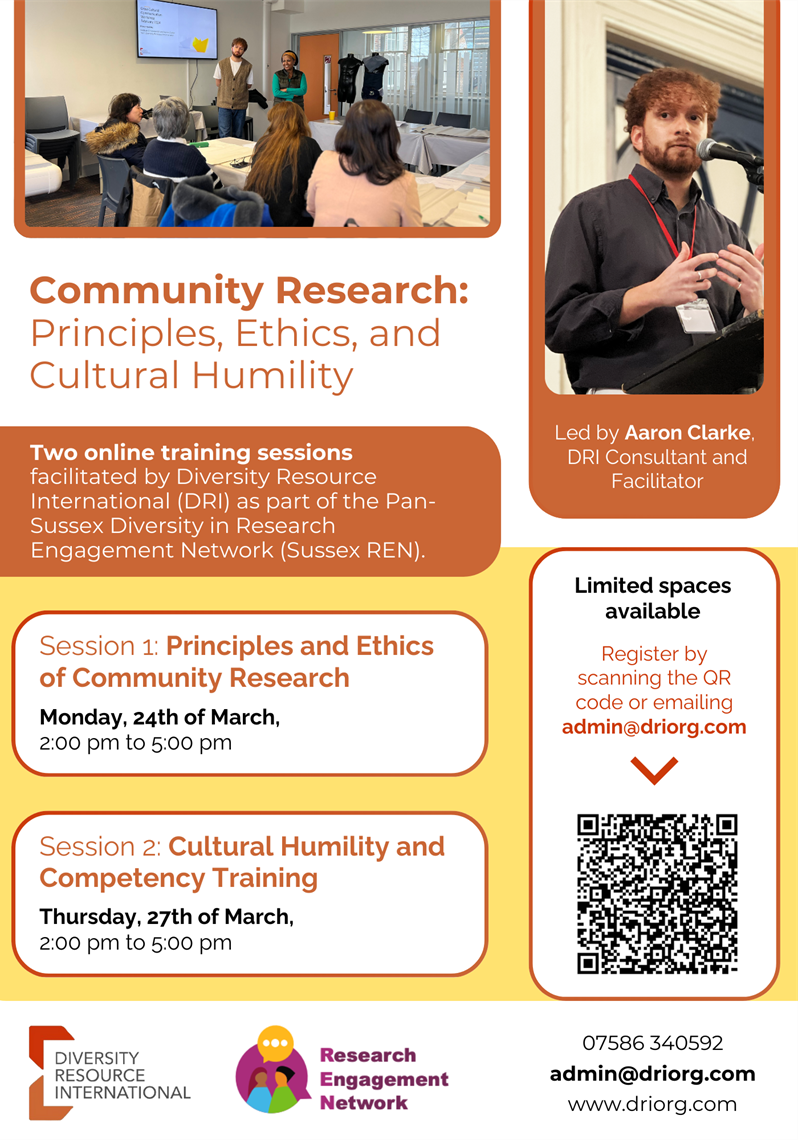
BACKGROUND IMAGE FOR PANEL
March 2025
Sussex Clinical Academic Conference 2025
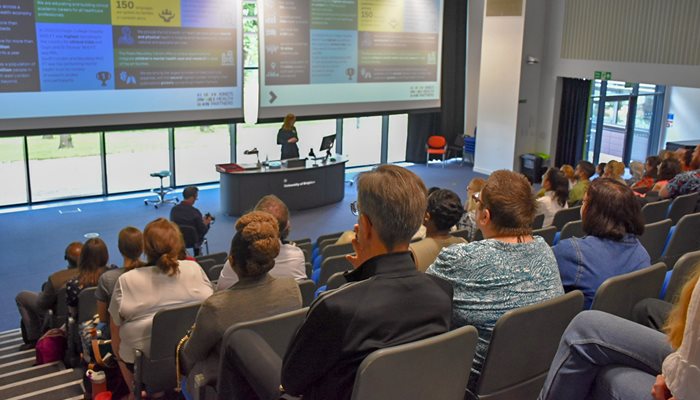
We are excited to announce that the fourth annual Sussex Clinical Academic Conference will be taking place on Wednesday 16 July 2025 at the University of Brighton Falmer campus.
This event is open to all health and care professionals undertaking research in Sussex.
Register here >
This will be an inspiring event with engaging speakers and an expert panel from a range of clinical academic backgrounds. This will be an excellent opportunity to network and learn more about the innovative research currently being undertaken by your peers across NHS Trusts, academic, health and care organisations in Sussex.
We invite you to submit an abstract for the poster or oral presentation competition at the conference via the link here.
Posters and oral presentations will be judged on the day by a team of experienced researchers.
Submitted abstracts could include: translation of research evidence into practice, increasing opportunities for patients to participate in research and developing or leading research.
Abstracts should be 350 words. Please use the following subheadings: Title / Background / Method / Results / Conclusion. For further detailed guidance on producing an abstract, please read more here.
The deadline for abstract submissions is 5pm, 31st May.If you are unable to submit an abstract via the above form, please send an email to iat@bsms.ac.uk.
Please note: All current SFPs, ACFs and Clinical Academics within the UHSussex Trust are invited to attend and should book study leave for this – it is expected that each academic trainee would submit 1 abstract.
BACKGROUND IMAGE FOR PANEL
February 2025
Sussex HCRP Research Catalyst Fund – Successful Projects Announced
The Research Catalyst fund was launched in September 2024, with the generous support of NHS Sussex. The aim is to support projects that develop the SHCRP’s research themes and establish Sussex’s distinctive strength in Health and Social Care research. The key themes are:
- Addressing Health Inequalities
- Digital and Data-Enabled Research
- Sustainable Healthcare
- Translational Research
Four projects were successful in their bid for funding.
Dr Nina Lockwood, Research Fellow in Primary Care and Public Health at BSMS, whose team made a successful application, said:
“We are delighted to have been awarded Catalyst funds to support our research focused on transforming midlife women’s intimate health and wellbeing in underserved coastal regions. With clear economic and ethical reasons for redressing the longstanding neglect of the health needs of variously marginalised midlife women, the funds will facilitate key preliminary work with our community partners and Sussex Integrated Dataset colleagues.”
Dr Wajeeha Aziz, Senior Lecturer in Medical Education at BSMS, said:
“We are delighted to have been successful with the reward. Ethnic minorities remain disproportionately affected by barriers such as cultural stigma and inadequate access to culturally-sensitive healthcare, especially in terms of their mental wellbeing. We hope this study will shine a light on these issues and contribute to a reduction in health inequalities in Sussex.”
Discover the awarded projects here >
December 2024
Commercial Research Delivery Centre brings £3.5million investment for University Hospitals Sussex
University Hospitals Sussex NHS Foundation Trust has been awarded almost £3.5 million to establish a Commercial Research Delivery Centre (CRDC). The centre, which is one of 20 being set up across the UK as part of a £100 million government investment, will enhance the speed and efficiency of commercial clinical research, providing more people in Sussex with access to cutting-edge treatments.
Professor Martin Llewelyn, the Clinical Director of Research and Innovation at UHSussex, and Academic Director of SHCRP, will also lead the new CRDC. He said: “The CRDC funding award is fantastic news for patients and staff at University Hospital Sussex and also for the wider population of Sussex. It will bring substantial commercial clinical research into our region. This will allow more people to access the latest treatment advances through clinical trials, help us develop research skills in the people who work in health and care and bring opportunities for job and economic growth across the region.”
The new centre will leverage the strengths and expertise of University Hospitals Sussex’s extensive NIHR portfolio, enhancing its role as a leader in clinical research and innovation. Professor Katie Urch, Chief Medical Officer at University Hospitals Sussex, highlighted the impact of this funding: “Research and Innovation are at the heart of our work to make UHSussex ready for the future.
“The CRDC award recognises the success of our Research Strategy 2023-2028 and the Sussex Health and Care Research Partnership we have established with NHS Sussex, partners across the Integrated Care System and universities. It will deliver substantial research-driven improvements in health, services and clinical outcomes for the people of Sussex.”
Health Minister Baroness Gillian Merron said: “This significant private investment in health research is a powerful vote of confidence in the UK’s leading research and life sciences sector.
The new hubs will help shift research into smaller communities, allowing more people to access cutting-edge treatments faster. Prevention is better than cure – these trials will help unlock the next generation of treatments, boost economic growth and build an NHS fit for the future.”
Professor Lucy Chappell, Chief Scientific Adviser at Department of Health and Social Care (DHSC) and Chief Executive Officer of the National Institute for Health and Care Research (NIHR), said: “Clinical trials help improve lives. Boosting the NHS’s capacity to deliver commercial clinical research through these new Commercial Research Delivery Centres will support recruitment across all communities and bring innovative treatments to patients.
“The effects of these centres will be felt right across the four nations, bringing investment into the UK’s life sciences sector.”
Read more about commercial research delivery centres on the Gov.uk website below.
Read more here >
BACKGROUND IMAGE FOR PANEL
November 2024
Senior Research Engagement Network Programme Officer Vacancy
An opportunity has arisen without our small, friendly team for a Senior Research Engagement Network (REN) Programme Officer. You will use your project management skills and experience to support the Sussex REN leadership team in managing the Pan-Sussex Diversity in Research Engagement Network. The role involves planning and delivering network activity, and advancing initiatives that aim to increase diversity, inclusivity and community engagement in health and care research.Creative approaches are welcomed in this role and the post holder will have the opportunity to use their skills to plan how we communicate to different audiences using different media. We very much welcome applications from partners from the voluntary and community sector. This could also be a secondment opportunity. This is a Part Time (0.4-0.6 FTE), Fixed Term (one year) role at University Grade 6.
Find out more and apply here >
BACKGROUND IMAGE FOR PANEL
November 2024
Research Manager Vacancy - Joint Clinical Research Office
A new vacancy for a Research Manager has opened at the Brighton and Sussex Joint Clinical Research Office. The role is a full-time, fixed term contract. The successful applicant will provide expert advice, support and coordination of clinical research studies through all stages of the research project life-cycle. Applications are welcome from those who have working experience of supporting research in an NHS context or University setting. You must have excellent and proven research management and organisational abilities. More information via the link below. The closing date for applications is midday on 9 December 2024.
Find out more here >
November 2024
Research Catalyst Funding Call is now Open – deadline 30 November
Applications are invited for funding of collaborative projects that help mature development of the system’s research themes and establish our distinctive strengths and needs as we seek substantial external funding in these areas of Health and Social Care Research:
- addressing health inequalities
- digital and data enabled research
- sustainable healthcare
- translational research
Please contact us via email with any budget-related queries and general advice: healthresearchpartnership@bsms.ac.uk
Download the Application Form here >
BACKGROUND IMAGE FOR PANEL
October 2024
Second annual SHCRP conference
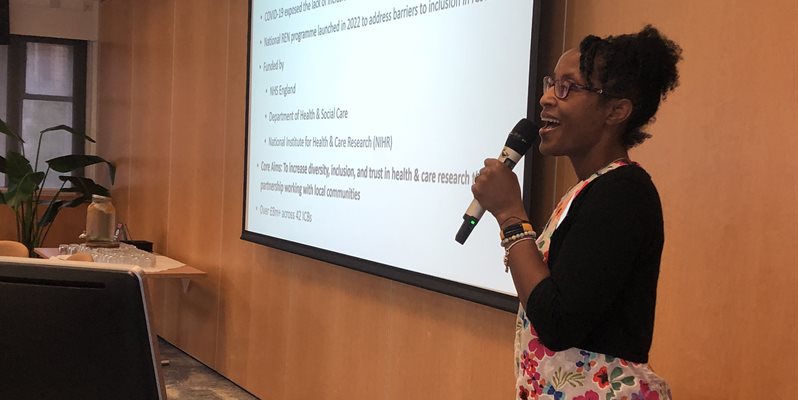
Tenth October saw more than 130 delegates gather for our second Annual Conference. The conference was a great opportunity for us to soft launch A System Strategy for Health and Care Research, which sets out our priorities for health and care research in Sussex, and explains how we will be working alongside NHS Sussex and public health in local government to delivery truly integrated research. The vision is that:
“In five years' time, the Sussex health and care system will have an integrated and sustainable research infrastructure and a culture of practice-embedded research. This will deliver high-impact research and drive improvements in population health, health and care services and outcomes for patients, service users and the broader community”.
Representatives off all three local government public health departments were there to explain their own research activity and priorities.
It was World Mental Health Day, and Mark Hayward, Head of Research for Sussex Partnership NHS Foundation Trust, demonstrated the key elements of the Research Cycle, accentuating the importance of sound design and consultation in the successful implementation of mental health care in Sussex.
We also heard from the new Research Delivery Network South East and Health Innovation Kent Surrey Sussex about their essential roles in ensuring good research leads to effective and innovative service delivery.
Our key speaker was Lindsey Hughes, Director of Research for NHS England, who explained the importance of the Integrated Care Systems, and how a joined-up approach between Health and Care Research is essential in the delivery of effective health and social care in the country.
Delegates from across our partnership had lots of opportunities for questions and enjoyed networking over lunch. Feedback from the day was overwhelmingly positive, which was enormously encouraging to the team. It has strengthened our resolve as we work to finalise the Strategy over the months ahead.
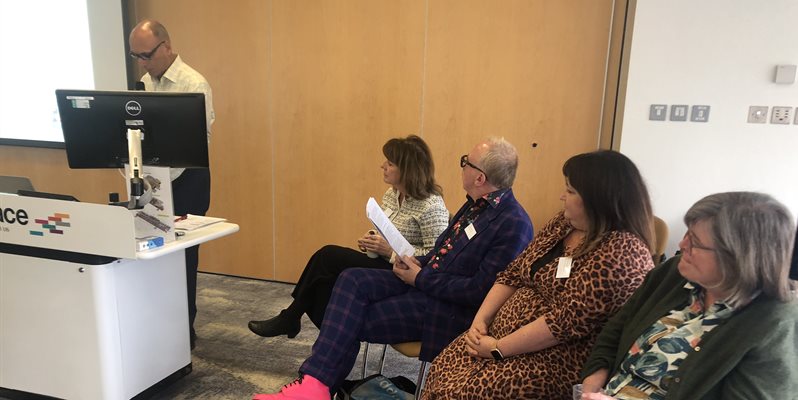
BACKGROUND IMAGE FOR PANEL
October 2024
We are delighted to announce upcoming opportunities for 5 new Academic Clinical Fellow positions to start in August 2025. Applications for these posts are now open and the closing date is 31 October. Please follow the links below for the Oriel adverts and more details on each post:
Intensive Care Medicine >
Infectious Diseases >
Haematology >
General Psychiatry >
Genito-urinary Medicine >
The IAT programme at BSMS is accessible for junior doctors undertaking specialty or core training or working in general practice.
Please contact us at iat@bsms.ac.uk if you have any questions about this, or would like to talk to meet with a member of our team.
BACKGROUND IMAGE FOR PANEL
September 2024
2024 SHCRP Conference
The 2024 SHCRP Conference is almost upon us, and we can now reveal the Programme.
The Conference will feature an in-depth look at the development of a Heath and Care Research Strategy for Sussex. This has been the primary focus of the team for the past few months, and we can’t wait to show you the progress we’ve been making. Part of this involves strengthening our relationships with those organisations delivering locally on public health.
Professor Anjum Memon will be chairing a session with representatives from the three local authorities in Sussex to explore how collaborative research can best be achieved for the benefit of our population. Our successful bid for Research Engagement Network funding last year has led to a valuable ongoing programme, and highlighted the importance of Engagement, Diversity and Inclusion in health and care research.
We are committed to engaging all members of our community in the research that affects them, and will be addressing this in a number of ways at the conference. Tickets are going very quickly, but there are still spaces left, so book now to ensure a place.
View the programme here >
Book your place here >
BACKGROUND IMAGE FOR PANEL
August 2024
NHS Sussex Research strategy
Kath Sykes, from Health Innovation Kent Surrey Sussex is working for NHS Sussex, with the Health Research Partnership and partners over the next 6 months to develop the NHS Sussex Research strategy in line with the ICBs duties under the Health and Care Act 2022. Kath has extensive clinical, academic and applied research experience and has worked in and across the Sussex system, and further afield, to develop and deliver research and innovation. Kath will be reaching out to all partners to ensure they are able to contribute to, and are sighted on, the development of this strategy and delivery plan. The research strategy will be soft launched at the Health Research Partnership (SHCRP) Conference on 10 October and Kath will continue to work with partners to finalise the research strategy and the NHS Sussex research delivery plan by April 2025.
Kath will be reaching out to key partners over the next few weeks, and will be holding a couple of webinars in September to engage partners with the development of the strategy. If you would like to speak to Kath about this strategy please email katherine.sykes@nhs.net.
You can also sign up to the Sussex SHCRP conference below.
Sign up here >
BACKGROUND IMAGE FOR PANEL
July 2024
Promoting Inclusivity in Sussex's Health & Care Research: Community Research Final Paper Published
The first phase of the pan-Sussex Diversity in Research Engagement Network (REN) successfully concluded in April. It was supported by a £100,000 NHS England grant. Launched in October 2023, the project aimed to establish a regional network of diverse community researchers, building capacity through development training and qualitative interviewing experience.
In collaboration with Voluntary, Community, and Social Enterprise (VCSE) partners, the project recruited fifteen community researchers with lived experience within the LGBTQ+, Transgender, Non-binary, Intersex (TNBI), and racially minoritised/global majority communities. Community researchers engaged individuals from minoritised groups in deprived areas of Sussex to understand how to better support their participation in health and care services and research. Over forty interviews were conducted, with many participants noting it was their first time being invited to partake in research. These interviews provided valuable insights on how to improve inclusivity in local research.
A key finding from community researchers is the need for research teams to consider how negative experiences and perceptions of marginalisation by mainstream society impact engagement in health and care research. Further research with TNBI communities is essential to address their unique challenges with the NHS, which affects their participation in research. Additionally, incorporating translation and interpretation support into all health and care research activities is crucial to provide equitable opportunities for people for whom English is not a first language to participate in local studies.
Community researchers also recommend that research teams adopt co-creative approaches, partnering with VCSEs and communities early in the research planning process. This collaborative method is seen as essential for making stepwise changes in how local health and care research is organised and conducted.
This project underscores the importance of inclusive practices in health and care research, ensuring that all community voices are heard and represented. The final paper offers a comprehensive overview for achieving more impactful engagement in health and care research in Sussex and beyond. With greater impact, we can begin to address the health inequalities that affect our communities.
Read the project report here >
July 2024
SHCRP Vacancy: Senior Research Methodology Advisor (Statistics/Epidemiology)
This new post is an exciting opportunity to contribute to the SHCRP’s development of early career health and care researchers. We are seeking to appoint somebody with a personal track-record of success in health and care research with diverse experience of research advising who can provide practical methodological support to early career researchers, to enhance the quality of research proposals, increase funding success rates and build research skills. The post holder will play a key role as strategic partner in supporting the SHCRP Leadership team in shaping the methodological support needed for research capacity grow and development in the region, as the partnership develops. The ideal candidate will have knowledge of/ expertise in areas of clinical research & trials, such as study design, qualitative methods, statistical methods, and data analysis. They will be able to confidently support, challenge, advise and provide support on the design of studies. The successful candidate will work closely with the Brighton and Sussex Clinical Trials Unit, the Joint Clinical Research Office, expert statisticians based at the Medical School and with clinical colleagues mainly based at University Hospitals Sussex NHS Foundation Trust and other local NHS Trusts. Please contact Virginia Govoni, Head of the Sussex Health Care Research Partnership at v.govoni@bsms.ac.uk for informal enquiries.
Read more and apply here >
BACKGROUND IMAGE FOR PANEL
May 2024
New funding for Coastal Community and Creative Health in Hastings – Join the Symposium!
A national partnership led by researchers at the Universities of Bristol and Liverpool has received £2.4 million to tackle health inequalities in coastal communities. The UK Research and Innovation (UKRI) funded project, led by Dr Lucy Selman of University of Bristol, will focus on three coastal areas of England with significant health inequalities but rich in community assets: Blackpool, Weston-super-Mare, and Hastings.
Coastal Community and Creative Health’, a co-investigation between East Sussex County Council, Blackpool & Fylde, and Bristol, will bring the NHS, local authorities, researchers, voluntary and community organisations and residents together to tackle health inequalities. It will focus in particular on three mental health priority areas: young people’s mental health, substance misuse, and life-limiting illness and bereavement. A key element is to enhance and widen access to creative community assets. To this end, co-production with local people will be integral to the project.
From 11-12 June, East Sussex County Council are delivering an Engagement and Research Symposium in Hastings to articulate their plans for the project. The aims of the symposium will be to disseminate learning from previous phases of this research and share plans for the project with partners and community members.
The objective is for attendees to feel informed about past and current activities and projects, and discover ways in which they can be involved in the research and hold a central stake in it, with direct benefit to the places in which they live.
Inclusivity is a guiding principle of the event, so the second day (12th) of the symposium will take a hybrid form, allowing access to those unable to attend in personTo register your interest and for further information, please email Edd Marshall Scheldt, Recovery and Renewal Project Officer at East Sussex County Council: Edward.MarshallScheldt@eastsussex.gov.uk.
BACKGROUND IMAGE FOR PANEL
May 2024
INSIGHT Award offers Masters Opportunities to Allied Healthcare and Local Authority Professionals
In April 2024 the Universities of Brighton, Chichester and Kent were successful in receiving an NIHR INSIGHT Award of £2.6million. The award is funded by the NIHR, and its mission is to inspire students into research.
The three Universities have now announced the NIHR INSIGHT Programme for South East Masters’ Scholarships, which will offer local authority, social care or midwives, nurses, and allied healthcare professionals the opportunity to study for an MRes/MSc in research.
There are courses available at the three Universities that offer a semi-structured entry into research and the chance to undertake an independent research project rooted in professional practice.
These courses are fully funded and available with an independent stipend.
Click the documents below, or email Dr Nina Stewart for more information. n.stewart1@brighton.ac.uk.
Click here to INSIGHT flyer >
Click here to INSIGHT FAQs >
BACKGROUND IMAGE FOR PANEL
May 2024
The Brighton and Sussex Health Care Research Partnership is launching a new Health and Care Research Training Hub. This exciting new initiative has been created to strengthen our expanding community of talented and innovative researchers.
The Hub is a single point of contact for advice, best practices, and information on health and care academic research careers and recruitment to research fellowships across Sussex. The hub is open to all health and care professionals from academic institutions, local authorities, and NHS Trusts across Sussex.
Please explore our brand-new website for more information on some of the academic and research opportunities we support, along with details on how we can help and guide your experience. The hub is in still in development so please stay tuned and check back for updates.
Visit the webpage here >
BACKGROUND IMAGE FOR PANEL
May 2024
Since we jointly launched the Pan-Sussex Diversity in Health and Care Research Engagement Network (REN) late last year, 15 people from LGBTQ+, Trans, Non-Binary & Intersex and Minoritised Ethnic groups have received community researcher development training, and conducted a total of 42 community interviews. They focused on:
- Experiences and perceptions of the NHS
- Accessing health and care information
- Awareness and understanding of NHS Health and Social Care Research
- Views on participation in research
On Tuesday 23 April 2024, we brought the community researchers together with the Trust for Developing Communities (training programme lead), and other community organisations in Sussex for a Celebration Event, to highlight their experiences and achievements.*
Jane Lodge, Deputy Director of Working with People and Communities NHS Sussex, opened the event. She outlined the lack of recruitment to studies for our marginalised communities, and also the lack of studies specifically looking at their unique experiences of the healthcare system.
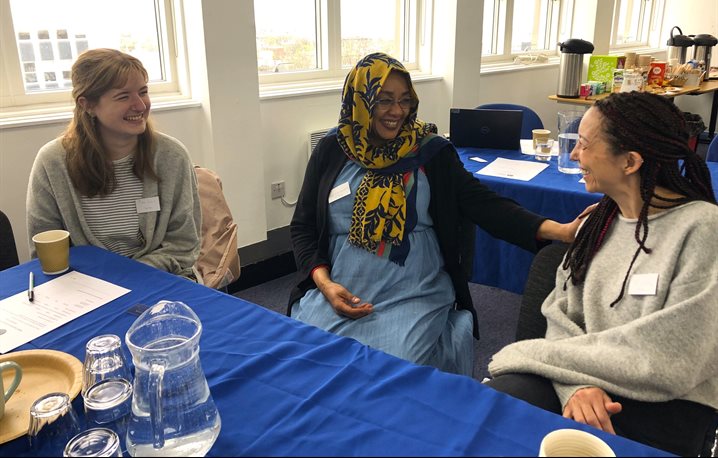
The community researchers who spoke explained what they learned from their experiences, both about themselves and their communities. They also talked about how their own experiences in healthcare were echoed by those they interviewed. Some community members said they had not engaged in research before because they had never been asked. Many described compounded barriers to participation and said they felt marginalised and discriminated against by the NHS in general. Trust was a key issue.
“People in my community are saying.. what’s this research gonna be used for, what agendas do people higher up have, even if the people we’re talking to might have a positive agenda?”
“The stories I’ve heard from my participants have been really difficult, as all have experienced so much in their lives from their treatment from the NHS… [it’s hard for them]..To try to be positive towards the NHS that has lost years of their lives, and nearly their lives, and also the chances of better health and respect and treatment.”
But they also described narratives of resilience, learning, and overcoming significant challenges.
“I was really grateful to hear that the next phase of this project would include the co-development of future bids with the community researchers. I think that’s really, really important, that the community researchers are involved from the inception of the project and I think I would love to see further opportunities for our community researchers to get involved”.
Partnering community organisations formed a discussion panel and we heard about what the REN meant to them and what they wanted to see next. There was agreement that more space and resources for co-production was needed and we need to do more research on intersectionality.
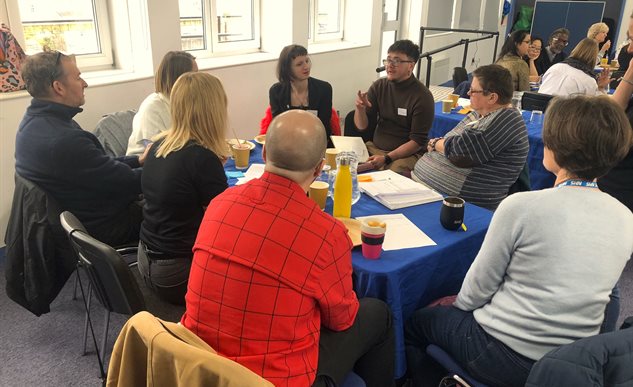
Attendees got into small groups and brainstormed ideas on how to take forward community research. Participants highlighted the importance of:
- ensuring early involvement of marginalised communities in the creation of research bids to ensure their voices are heard
- looking to communities to provide their own experiences and offer their own solutions
- reforming discriminatory practices and lack of awareness of Trans, Non-Binary & Intersex people's needs and lived experiences
- embedding interpreting and translation into research studies
- engaging councils and social care in community research
- ensuring findings are disseminated back to communities in a way that suits them
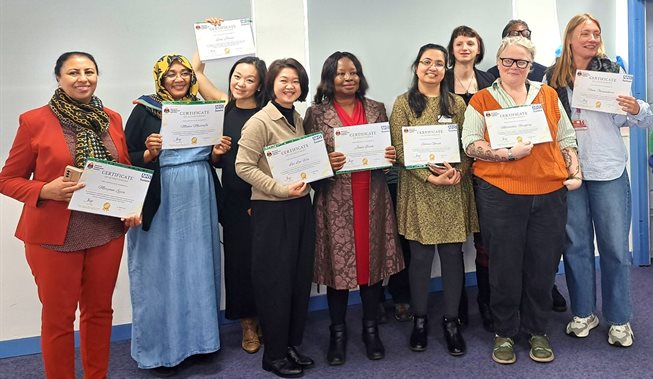
Everyone came out of the celebration event touched by what they had heard, and by the resilience and determination of the researchers and their communities. There was an energy in the room to keep pushing to ensure research is relevant and meaningful to communities so that they can be better engaged. Only then can we genuinely start to address health inequalities in health and care services and outcomes.
Detailed reports of the community researcher findings and the wider independent REN evaluation will be available in June 2024.
*The other REN partner community organisations are Diversity Resource International (DRI), Sussex Interpreting Service (SIS), Brighton & Hove Switchboard, The Clare Project, Crawley Community Action, 3VA and Voluntary Action Arun and Chichester. Kent, Surrey & Sussex Clinical Research Network is the REN National Institute for Health & Care Research partner.
BACKGROUND IMAGE FOR PANEL
April 2024
Callout to researchers
University Hospitals Sussex is looking for five health and care researchers to be a part of something exciting! The research team is passionate about research and innovation and how it can better serve its patients, families, and staff. Within the next five years all patients and staff should be able to take part in healthcare research. However, we need your input to shape how we can make this happen.
Join us for a collaborative workshop where you will meet with a range of people who are also passionate about healthcare research. Together we will create a plan of action to enable all patients and staff to take part in research. You will work together with research experts at University Hospitals Sussex to create positive ways of getting everyone involved.
This three-hour session promises lively discussion, with plenty of refreshments of course.
Details:
Wednesday 1 May 2024
10.00-13.00
Worthing Library
If you have any support needs please let us know.
To join the workshop, please email anna-marie.bibby-jones@spft.nhs.uk by 15 April 2024.
BACKGROUND IMAGE FOR PANEL
April 2024
Increasing Diversity in Research Participation: Research Engagement Network (REN) project update
The REN project is an NHS England funded project to work closely with communities. Our Sussex project has focused on co-designing and delivering a community researcher development programme for people who are Lesbian, Gay, Bisexual, Transgender, Queer/Questioning and other identities (LGBTQ+) and/or from minoritised ethnic backgrounds (further details on the REN can be found in our previous December Newsletter). It has been a tremendously exciting project and a great opportunity to reach underserved groups in Brighton and Sussex, whose voices are rarely heard in research studies.
We recruited 15 Community Researchers, and held two training sessions in Brighton, where volunteers discovered how best to collect qualitative data in their communities.
Terry Adams (pictured below), who led the training, said:
"Community research is based on conducting research with communities, not on communities. Community Researchers reflect the background and characteristics of the people being researched.
Despite the limitations of time, the results coming from the research reveal a rich and robust set of findings that not only represent an authentic voice of these communities, but also offer insight into solutions to the issues for the NHS and the communities that can be effectively addressed. All the Community Researchers have commented on the positive experience of participating. All desire to build on what they have learnt, improve their research skills, and contribute more to the objectives of the NHS health and social care research programmes."
The data collection is now complete. Each Community Researcher carrying out three interviews with members of the public to find out about their interest and understanding of health and care research. Their reports are now being consolidated and will be published in April/May. We look forward to sharing the results in our summer newsletter.
We are excited to be working on two upcoming REN events planned for April; a Sussex REN celebration event to recognise and acknowledge the partnership building, Community Researchers and work carried out so far; and a South-East Pan Regional event with members of the six REN projects in the region coming together to share learning.

March 2024
SHCRP PCIE update
We would like to take this opportunity to introduce you to our five public advisers who currently make up our SHCRP PCIE Group:
Chair: Simon Porges
Simon lives in Hove, East Sussex and has been a Research Champion at University Hospitals Sussex NHS Foundation Trust for three years, which has given him the chance to get involved in many research related activities.
Deputy Chair: Dr Palo Almond
Palo is a former health professional and public health academic, and supports the NHS and Sussex Universities’ research activities as a patient and community engagement advisor.
Group members: Alan Sutton, Amy Broadbent, Dr Sarah Markham
Alan holds a number of volunteer roles, including being an Elected & Lead Governor for the Sussex Community NHS Foundation Trust and a long standing NIHR Public Research Champion for his trust, the University Hospitals Sussex NHS Foundation Trust and the wider Kent Sussex and Surrey region.
Amy Broadbent is an Expert by Experience, using her experience of children and young people's services to support best practice. Amy also works as a youth consultant for NHS Sussex and lectures at the University of Brighton.
Sarah Markham is a long-term patient and pure mathematician active in patient public involvement both locally and nationally across many dimensions.
We strive to have diverse members of our group who live in different parts of Sussex and bring different knowledge and skills. We are working closely together and have been meeting monthly, the group are currently working on the strategy development for the SHCRP and are continuing to develop their identity. We aim to reach out to other groups in the region in the near future and are also working on updating our webpages, so watch this space.
BACKGROUND IMAGE FOR PANEL
February 2024
Researcher Spotlight: Dr. Diane Sellers, Chailey Clinical Services
I work at Chailey Clinical Services at Sussex Community Foundation Trust which offers specialist clinical care for children and young people with complex neuro-disability. I feel privileged to have led or been involved in life-enhancing and life-changing research activity for this overlooked population. My work developing and implementing the Eating and Drinking Ability Classification System for people with cerebral palsy has brought me into contact with families, clinicians and academics across the globe. I feel incredibly proud of the work that we started at Chailey. The Eating and Drinking Ability Classification System has become an international marker of eating, drinking and swallowing difficulties and associated risks to health for those with cerebral palsy. Learn more here >
Clinicians at Chailey Clinical Services are in close contact with children and their families; they tell us about the things that matter to them. One recent “hot topic” was parents’ use of home-blended foods rather than prescribed liquid formula feeds, given to their children via feeding tubes. We supported the Your-Tube study team to recruit children and families to investigate benefits of home-blended diets compared to liquid formula diets for children who are gastrostomy fed and their parents. The exciting findings which support changes to healthcare practice are here >
We understand the importance of research partnerships, to answer important clinical questions with academic rigour. We are excited to be collaborating with clinicians and researchers from BSMS, University of Exeter and University of Surrey to conduct an RCT of Breathe-Easy - a new postural management night-time intervention to improve respiratory health of children with complex neuro-disability. Learn more here >
See Dr. Sellers talk more about her work with the EDACS at last year’s SHCRP Conference.
Click here to watch the video >
BACKGROUND IMAGE FOR PANEL
October 2023
NHS England REN Cohort 2 Partners – joint statement
Sussex Integrated Care System (ICS) in partnership with Brighton and Sussex Health Research Partnership (SHCRP) has been awarded £100,000 of funding from NHS England to work in partnership with voluntary, community and social enterprise (VCSE) organisations across Sussex, with the aim to engage minoritised groups from areas of deprivation and to improve research participation.
The project will be led by Anna-Marie Bibby-Jones, Senior Research Fellow for Equality Diversity & Inclusion, Sussex Partnership NHS Foundation Trust; Jane Lodge, Associate Director of Public Involvement and Community Partnerships, Sussex Health and Care Partnership; and Virginia Govoni, Head of Health Research Partnership.
Building on the NHS Sussex Community Ambassador Network and community feedback, they plan to co-create and implement a Community Researcher Development Programme. People from our local minoritised ethnic communities and Lesbian, Gay, Bisexual, Queer/Questioning and other identities (LGBTQ+) communities will be invited to receive Community Researcher training. They will reach out into various parts of Sussex to explore connections between communities and health and care research. Their findings will be crucial for guiding health and care providers and researchers on how we can do better at engaging marginalised groups.
The project leads will also launch a new pan-Sussex Diversity in Health and Care Research Engagement Network to bring together our local Grassroots organisations, larger VCSEs, the Integrated Care System (ICS) and health and care researchers. An independent impact evaluation will be conducted by Professor of Social Work and Social Policy, Kish Bhatti-Sinclair from the University of Chichester.
Trust for Developing Communities will lead VCSE involvement in the project. Kaye Duerdoth, Deputy Chief Executive said: “I am looking forward to this new collaboration which brings community research learning opportunities as well as greater understanding about engaging with communities effectively. This insight will lead to improved services for our communities.”
Prof Martin Llewelyn, Clinical Director of Research and Innovation at University Hospital Sussex said: “The REN award comes at a very good time. Both the Trust and the SHCRP are setting their strategies for the next five years now. The award will help ensure there is really strong and diverse public input as these strategies take shape.”
Other VCSEs involved in the project are Diversity Resource International (DRI), Sussex Interpreting Service (SIS), Brighton & Hove Switchboard, The Clare Project, Crawley Community Action, 3VA and Voluntary Action Arun and Chichester.
September 2023
We are delighted to be able to announce the speakers for our October annual conference. Delegates will hear from a wide range of professional colleagues around core-themed sessions on Sustainable Healthcare, Digitally-enable Healthcare, Reducing Inequalities, and Multi-Professional Research, and we are pleased that Professor David Wynick of Bristol Health Partners will be conducting the plenary address on Building Research, Service and Public Partnerships.
BACKGROUND IMAGE FOR PANEL
August 2023
The second Sussex Health Care Research Partnership Conference will be held on Thursday 19 October 2023. We invite contributions from researchers working in health and care across Sussex to make a short presentation, or poster, of their research. We are particularly interested in projects that showcase collaborations between institutions, across service providers and with community involvement and in research in one of the following areas: digitally enabled healthcare, sustainable healthcare, addressing inequalities, and life-long mental health.
BACKGROUND IMAGE FOR PANEL
July 2023
Recruitment of Public Advisers (x4) to the SHCRP
We are recruiting public advisers to become members of our Sussex Health Care Research Partnership public, community, involvement and engagement advisory group (SHCRP PCIE advisory group). The group is a new venture and is currently being established. The aspiration is to grow this group to reach 10 – 12 members. The group will initially be piloted for 3 years. The role of public adviser to the SHCRP is key to the promotion of the interests of the public and local communities in all aspects of research by providing patient and public perspectives operationally and in strategic development.
VIEW THE ROLE PROFILE HERE >
VIEW THE FULL ADVERT HERE >
Recruitment open for new Research Manager role
Applications are open to join our team as Research Manager. View the role and apply below, or contact Zoe Boylan (Z.Boylan@sussex.ac.uk) for more info.
APPLY FOR THE ROLE HERE >
June 2023
We are delighted to announce our second Sussex Health Care Research Partnership Conference, which will be held on Thursday 19 October 2023.The conference will be an opportunity to:
- Learn about the Partnership’s strategy for developing Health and Care Research in Sussex 2024-2030
- Find out how the Partnership can help you develop your research
- Help shape the work of the partnership
- Hear about different areas of health and care research across Sussex
- Highlight your research and strengthen its impact
- Build collaborations across the Partnership.
The event will include a light lunch and will be free, with places limited to 150 people.
This year at the conference there will be a wide range of talks and poster presentations to showcase the work of our Partners in delivering research excellence in health and care in Sussex.
We invite contributions from researchers working in health and care across Sussex to make a short presentation, or poster, of their research.
We are particularly interested in projects that showcase collaborations between institutions, across service providers and with community involvement and in research in one of the following areas: digitally enabled healthcare, sustainable healthcare, addressing inequalities, and life-long mental health.
BACKGROUND IMAGE FOR PANEL
February 2023
We are delighted to announce that in early February Virginia Govoni joined us as the new Head of SHCRP and JCRO. Virginia has a Master’s Degree in Chemistry and Pharmaceutical Technologies from the University of Bologna, and MPhil in Diabetes and Nutritional Sciences from King’s College London. She has 10 years’ experience in medical research settings, leading senior clinical academics to deliver major strategic and complex programmes and collaborations at Queen Mary University of London and King’s College London. Virginia joins us from Barts Charity, a healthcare charity based in East London, supporting local institutions to deliver innovative research and great healthcare to the local population. “I am very excited to start this new role. In the Brighton and Sussex area there is much potential to develop impactful research for the benefit of local institutions, staff and local communities. I am looking forward to developing these collaborations, building on local excellence and strengths in healthcare and medical research.”
VIEW VIRGINIA'S FULL PROFILE >
BACKGROUND IMAGE FOR PANEL
October 2022
The Sussex Health Research Care Partnership (SHCRP) was officially launched at a meeting on Friday 30 September. The meeting was well attended by representatives from across the partnership and number of stakeholders.
READ THE FULL STORY HERE >
September 2022
With the launch of the SHCRP, we conducted a brief survey to understand the research landscape across Brighton and Sussex Medical School and the academic and clinical partners (University of Sussex, University of Brighton, Sussex Partnership NHS Foundation Trust and University Hospitals Sussex NHS Trust). The survey is now closed. For a summary of the findings, please contact us at our email address below. The results of this survey will be used to map the strategies for the three SHCRP workstreams of Infrastructure, Research Capacity & Training, and Academic Groups.
BACKGROUND IMAGE FOR PANEL
June 2022
First SHCRP executive meeting. The work of the SHCRP began in earnest in June with the first meeting of the Executive. The group reviewed Terms of Reference of the Partnership’s workstreams and began work scoping the extent of partnership activity towards its first report to the Partnership Board meeting in September.